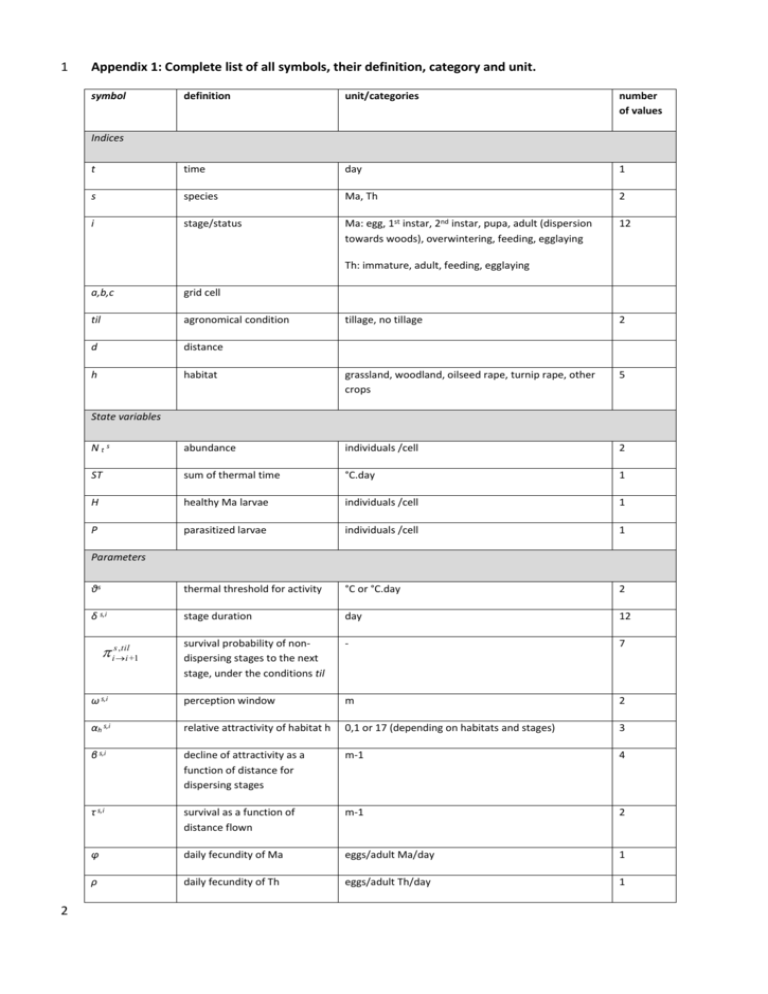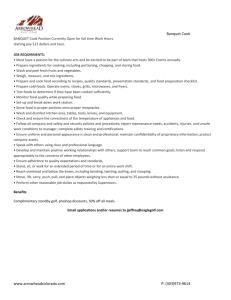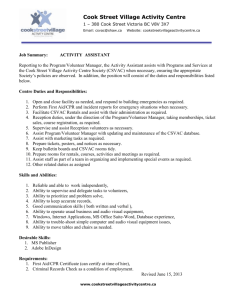Appendix 1: Complete list of all symbols, their definition, category
advertisement

1 Appendix 1: Complete list of all symbols, their definition, category and unit. symbol definition unit/categories number of values t time day 1 s species Ma, Th 2 i stage/status Ma: egg, 1st instar, 2nd instar, pupa, adult (dispersion towards woods), overwintering, feeding, egglaying 12 Indices Th: immature, adult, feeding, egglaying a,b,c grid cell til agronomical condition d distance h tillage, no tillage 2 habitat grassland, woodland, oilseed rape, turnip rape, other crops 5 Nts abundance individuals /cell 2 ST sum of thermal time °C.day 1 H healthy Ma larvae individuals /cell 1 P parasitized larvae individuals /cell 1 θs thermal threshold for activity °C or °C.day 2 δ s,i stage duration day 12 survival probability of nondispersing stages to the next stage, under the conditions til - 7 ω s,i perception window m 2 αh s,i relative attractivity of habitat h 0,1 or 17 (depending on habitats and stages) 3 β s,i decline of attractivity as a function of distance for dispersing stages m-1 4 τ s,i survival as a function of distance flown m-1 2 φ daily fecundity of Ma eggs/adult Ma/day 1 ρ daily fecundity of Th eggs/adult Th/day 1 State variables Parameters is,tili+1 2 3 Appendix 2: Complete list of all symbols, their definition, category and unit. Parameter Parameter value Reference N0Ma 200 (Rusch et al. 2011) θ Ma 15 (Nilsson 1988a) π Ma, winter 0.7 (Cook et al. 2004) π Ma, egg 0.9 (Cook et al. 2004) π Ma, l1 0.8 (Cook et al. 2004) π Ma, l2 0.5 (Cook et al. 2004) π Ma, pupa 0.7 (Cook et al. 2004) δ Ma, egg 8 (Cook et al. 2004) δ Ma, l1 5 (Cook et al. 2004) δ Ma, l2 6 (Cook et al. 2004) δ Ma, pupa 10 (Cook et al. 2004) δ Ma, adult 60 (Cook et al. 2004) φ Ma 5 (Nilsson 1988b) δ Ma, feeding 14 (Cook et al. 2004) δ Ma, egglaying 2 (Cook et al. 2004) τ Ma 0.999 - β Ma 1 (Taimr et al. 1967) ω Ma, adult 300 (Rusch et al. 2011) ω Ma, feeding 9600 (Rusch et al. 2011) N0 400 - θ Th, immature 70 (Jourdheuil 1960) π Th, immature, NT 0.2 (Herrström 1964) Pest Demographic parameters Dispersal parameters Parasitoid Demographic parameters π Th, immature, ploughing 0.0 (Nilsson 2010) δ Th, immature 0.5 (Jourdheuil 1960) δ Th, adult 50 (Jourdheuil 1960) ρ Th 250 - δ Th, feeding 8 - δ Th, egglaying 1 - τ Th 0.999 - β Th 3 - ω Th, adult 500 (Rusch et al. 2011) ω Th, feeding 1750 (Rusch et al. 2011) Dispersal parameters 4 5 6 References 7 8 9 10 11 12 13 14 15 16 17 18 19 20 21 22 23 24 25 26 27 28 Cook, S., Murray, D., & Williams, I. 2004. Do pollen beetles need pollen? The effect of pollen on oviposition, survival, and development of a flower-feeding herbivore. Ecological Entomology, 29, 164-173. Herrström, G. 1964. Untersuchungen über Parasiten von Ölfruchtschädlingen in Sweden. Meddn. StVäxtskAnst., 12, 433-448. Jourdheuil, P. 1960. Influence de quelques facteurs écologiques sur les fluctuations de population d’une biocénose parasitaire. Paris, France: INRA. Nilsson, C. 1988a. The pollen beetle (Meligethes aeneus F.) in winter and spring rape at Alnarp 19761978. I. Migration and Sex Ratio. Växtskyddsnotiser, Nilsson, C. 1988b. The pollen beetle (Meligethes aeneus F.) in winter and spring rape at Alnarp 19761978. II. Oviposition. Växtskyddsnotiser, Nilsson, C. 2010. Impact of soil tillage on parasitoids of oilseed rape pests. In: Biocontrol-Based Integrated Management of Oilseed Rape Pests, (Ed. by I. Williams), pp. 45-76. Dordrecht: Springer Netherlands. Rusch, A., Valantin-Morison, M., Sarthou, J.-P., & Roger-Estrade, J. 2011. Multi-scale effects of landscape complexity and crop management on pollen beetle parasitism rate. Landscape Ecology, 26, 473-486. Taimr, L., Sedivy, J., Bergmannova, E., & Hanker, I. 1967. Further experience obtained in studies on dispersal flights of Meligethes aeneus F., marked with P32 (Coleoptera). Acta Entomol Bohemos, 64, 325-332.







